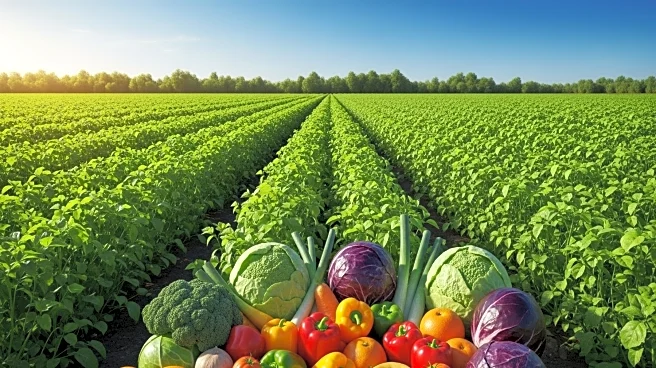What's Happening?
The organic farming market in the United States is anticipated to grow significantly, reaching $287.3 billion by 2032, according to a report by DataM Intelligence. This growth is driven by increasing consumer demand for chemical-free and environmentally friendly food products. The market, which was valued at $171.5 billion in 2024, is expected to expand at a compound annual growth rate (CAGR) of 6.7% from 2025 to 2032. Recent initiatives by companies such as Earthbound Farm and Amy's Kitchen are contributing to this growth by launching organic crop initiatives and investing in regenerative agriculture. Mergers and acquisitions, like Driscoll's acquisition of an organic berry farm, are also strengthening the market by enhancing supply chain reliability and product quality.
Why It's Important?
The expansion of the organic farming market is significant for several reasons. It reflects a growing consumer preference for healthier and sustainable food options, which is reshaping the agricultural landscape. This shift is encouraging producers to adopt organic farming practices that promote soil health, biodiversity, and sustainable water use. The market growth also indicates potential economic benefits, as organic farming can lead to increased job opportunities and support for local economies. Additionally, government incentives and certification programs are likely to further boost the adoption of organic farming, positioning it as a critical component of modern agriculture.
What's Next?
As the organic farming market continues to grow, stakeholders can expect further investments in sustainable farming practices and technologies. Companies may focus on enhancing efficiency and yield through techniques like integrated pest management and crop rotation. The expansion of organic food retail and e-commerce platforms will likely facilitate market growth, providing consumers with easier access to organic products. Additionally, collaborations between established companies and startups specializing in organic farming technology may lead to innovative solutions that support large-scale organic farming operations.
Beyond the Headlines
The rise of organic farming also has deeper implications for environmental sustainability and public health. By reducing reliance on synthetic fertilizers and pesticides, organic farming can help mitigate environmental pollution and promote healthier ecosystems. Furthermore, the emphasis on traceable and high-quality food products aligns with consumer demands for transparency and safety in food production. This trend may encourage broader shifts towards sustainable agricultural practices globally, influencing policy decisions and industry standards.












